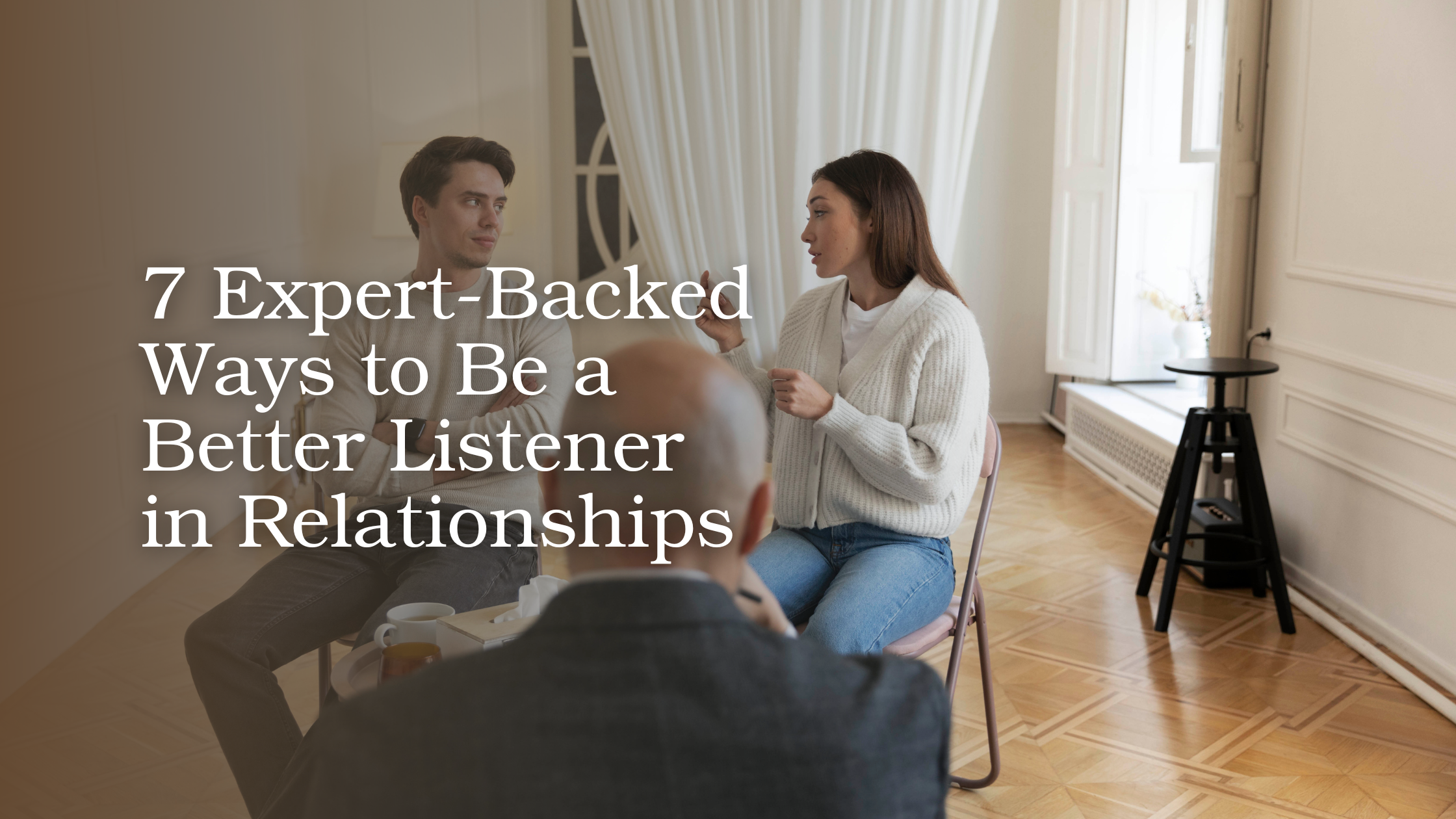7 Expert-Backed Ways to Be a Better Listener in Relationships
In any relationship, the ability to truly listen can make the difference between connection and conflict. Many couples struggle not because they don’t care, but because they fall into habits of distracted, reactive, or surface-level listening. According to research published in the Journal of Marriage and Family, communication problems rank among the top three reasons couples report dissatisfaction. Listening, however, is a skill that can be developed, and small intentional changes can dramatically improve understanding, empathy, and emotional intimacy. By learning to focus on presence, interpret feelings, and respond thoughtfully, partners can reduce misunderstandings and create a stronger foundation for lasting connection.
The following strategies are designed to guide How to be a Better Listener in Relationships Each approach builds on the previous one, so that as you practice, your conversations become more meaningful, your emotional attunement stronger, and your connection deeper.
1. Give Your Full Attention to Transform Conversations

Being fully present is the first step toward how to be a good listener in relationships . Distractions like phones, TV, or wandering thoughts can make a partner feel ignored and undervalued. Emily, for example, often scrolled through her phone while her partner shared his day, which gradually built frustration and small misunderstandings. Once she consciously focused entirely on him, even brief conversations felt more meaningful and connected.
Tips to Practice Full Attention:
- Put away phones, tablets, and other devices during conversations.
- Maintain natural eye contact and nod occasionally to show engagement.
- Listen to understand emotions, not just words.
- Use small verbal affirmations like “I see” or “I understand.”
Why it works:
- Studies show 74% of people believe attentive listening improves personal communication.
- Being fully present allows you to pick up subtle emotional cues, fostering trust and emotional intimacy.
2. Focus on Understanding Rather Than Responding
Many arguments escalate because partners listen with the goal of replying instead of understanding. Alex often prepared his rebuttal while his partner spoke, which prolonged conflicts and led to frustration. When he shifted his focus to understanding her perspective first, discussions became calmer, collaborative, and emotionally connected.
Steps to Listen for Understanding:
- Pause and resist planning your response while your partner speaks.
- Reflect silently on what they are feeling before replying.
- Ask clarifying questions if you are unsure about their meaning.
- Summarize what you heard in your own words to confirm understanding.
Couples who prioritize understanding rather than responding report higher satisfaction and emotional closeness
3. Reflect Your Partner’s Words to Build Deeper Connection
Reflective listening, or mirroring, helps your partner feel heard and validated. Samantha shared her frustrations about her workload, and instead of offering solutions, her partner responded, “It sounds like you’re feeling overwhelmed by your deadlines.” This acknowledgment reduced tension and made her feel understood.
Quick Reflection Techniques:
- Repeat or paraphrase key phrases: “So you’re saying that…”
- Focus on the emotions behind the words: “It seems like you felt…”
- Avoid immediately correcting or solving; reflect first.
Why it matters:
- Reflective listening reduces misinterpretation.
- Couples practicing this report stronger trust and less conflict.
4. Validate Feelings Instead of Offering Immediate Solutions
Many people instinctively try to solve problems when a partner expresses emotion, but validation is often more important. When Jordan’s partner came home stressed about a workplace misunderstanding, he initially wanted to offer advice. Instead, he acknowledged her feelings: “I understand why that upset you; that sounds really frustrating.” Simply recognizing her emotions made her feel supported and diffused tension.
Ways to Validate Emotions:
- Listen without interrupting or judging.
- Use statements that acknowledge feelings: “It makes sense you feel that way.”
- Avoid jumping immediately into solutions unless asked.
Emotional validation strengthens relationships and reduces conflict intensity.
5. Let Your Partner Speak Without Interruptions to Strengthen Trust

Interruptions, even subtle ones, can make partners feel dismissed. Maya realized she often interrupted during discussions, which created tension. By consciously waiting until her partner finished speaking, their conversations became more respectful and productive.
Tips to Avoid Interrupting:
- Count to two silently after your partner stops speaking before responding.
- Keep a mental note of your thoughts without interjecting immediately.
- Focus on understanding their full perspective before adding your input.
Why it works:
- Studies show that couples practicing empathic listening, which includes not interrupting, report higher satisfaction and stronger emotional connection.
6. Ask Open-Ended Questions to Encourage Honest Sharing
Yes or no questions often limit conversation, while open-ended questions invite partners to express themselves more fully. Instead of asking, “Did you have a good day?” Mark asked, “What part of your day stood out to you?” This simple change led to more meaningful discussions and deeper emotional intimacy.
How to Ask Effective Questions:
- Focus on feelings: “How did that make you feel?”
- Explore perspectives: “What do you wish had happened differently?”
- Avoid judgmental or leading questions that might shut down conversation.
Why it works:
- Open-ended questions give your partner space to share authentically, helping both of you understand each other better.
- Couples who regularly practice this report fewer misunderstandings and more emotional closeness.
7. Align Your Body Language and Tone With Your Words
Your nonverbal cues often speak louder than words. Even well-intended phrases can feel insincere if your posture, tone, or facial expressions communicate defensiveness or disinterest.
Imagine this:
During a serious conversation, Mark told his partner, Ava, that he was listening, but he kept checking his phone and sighing heavily. Ava felt that he didn’t really care about what she was saying. In their next talk, Mark made a conscious effort to put his phone aside, face her directly, and nod while she spoke. Ava immediately felt the difference, she said, “It finally feels like you’re here with me.”
Key aspects to consider:
- Maintain open and relaxed posture.
- Keep your tone soft and even.
- Make appropriate eye contact to show attentiveness.
- Avoid gestures that indicate frustration or detachment.
Matching body language and tone with your words reinforces sincerity and demonstrates that you are fully engaged in the conversation.
When and How Professional Guidance Can Improve Communication

Even with effort, some couples struggle to break long-standing communication patterns. Seeking guidance from a therapist can provide structured strategies to How to be a Better Listener in Relationships and reduce conflict. Many couples working with Dr. Harel Papikian in Los Angeles have reported that structured sessions helped them understand each other better, resolve recurring arguments, and practice new communication habits. Virtual sessions make it easier to integrate these skills into everyday life, allowing couples to apply techniques in real situations with professional guidance.
Benefits of Professional Support:
- Learn practical communication tools and emotional regulation techniques.
- Identify recurring patterns and obstacles in your relationship.
- Practice active listening in a safe, guided environment.
Bringing It All Together
Improving listening skills takes awareness, patience, and consistent effort. By giving full attention, focusing on understanding rather than responding, reflecting words and emotions, validating feelings, avoiding interruptions, asking open-ended questions, and seeking guidance when needed, couples can strengthen their connection and reduce conflict. Real-life examples show that even small changes, like putting away a phone or asking “How did that make you feel?” can dramatically improve communication. According to a survey by the Gottman Institute, couples who engage in structured listening exercises are 40% more likely to report increased satisfaction in their relationship.
For couples or individuals struggling with communication, working with a professional can accelerate results. Dr. Harel Papikian,, helps clients develop practical strategies to listen effectively, respond thoughtfully, and foster deeper emotional intimacy. All sessions are virtual, allowing couples to work together from the comfort of their own homes.
Contact Information:
Phone: (310) 713-6093
Email: Dr.Harel@westhollywoodcouples.com
Address: 822 S Robertson Blvd #303, Los Angeles, CA 90035
By committing to these strategies, you are investing not just in your relationship but in building a more connected, understanding, and emotionally resilient partnership.

Leave a Reply